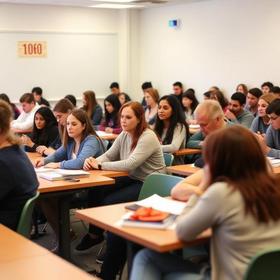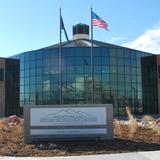- Joyce University of Nursing and Health Sciences, formerly known as Ameritech College of Healthcare, is one of the largest nursing schools in Utah. Founded in 1979, Joyce University`s mission is to prepare students to serve as competent professionals, to advance their careers, and to pursue lifelong learning. Located in Draper, Utah, Joyce University is proud to have helped thousands of students graduate and launch lasting healthcare careers.
School Highlights
Joyce University of Nursing and Health Sciences serves 3,421 students (76% of students are full-time).
The college's student-teacher ratio of 11:1 is lower than the state community college average of 16:1.
Minority enrollment is 29% of the student body (majority Hispanic), which is equal to the state average of 29%.
Quick Facts (2026)
- Enrollment: 3,421 students
- Private-state tuition: $18,320
- Acceptance Rate: 86%
- Student-teacher ratio: 11:1
- Minority enrollment: 29%
- Source: Verified school update
School Overview
The teacher population of 300 teachers has grown by 152% over five years.
Joyce University of Nursing and Health Sciences
(UT) Community College Avg.
Carnegie Classification
Special Focus Four-Year: Other Health Professions Schools
Not applicable, not in Carnegie universe (not accredited or nondegree-granting)
Institution Level
Four or more years
Four or more years
Institution Control
Private for-profit
Public
Total Faculty
300 staff
215 staff
Number of Programs Offered
8
23
School Calendar
Student Body
The student population of Joyce University of Nursing and Health Sciences has grown by 139% over five years.
The student-teacher ratio of 11:1 has decreased from 30:1 over five years.
The Joyce University of Nursing and Health Sciences diversity score of 0.47 is equal to the state average of 0.47. The school's diversity has grown by 55% over five years.
Total Enrollment
3,421 students
4,285 students
Student-Teacher Ratio
11:1
16:1
# Full-Time Students
2,592 students
891 students
# Part-Time Students
829 students
3,394 students
# Enrollment Undergraduate
325 students
367 students
# Full-Time Undergraduate Students
2,459 students
891 students
# Full-Time Graduate Students
133 students
133 students
# Part-Time Undergraduate Students
792 students
3,394 students
# Part-Time Graduate Students
37 students
563 students
Total Dormitory Capacity
n/a
750 students
% American Indian/Alaskan
n/a
1%
% Asian
4%
2%
% Hispanic
13%
13%
% Black
3%
1%
% White
71%
71%
% Hawaiian
1%
1%
% Two or more races
1%
3%
% Non Resident races
n/a
4%
% Unknown races
7%
4%
Diversity Score
0.47
0.47
College Completion Rate (Students who graduate in less than 4 years)
81%
51%
College Completion Rate (Students who graduate in 4 years or more than 4 years)
71%
47%
Average Graduate Earnings (10 Years)
$26,900
$32,700
Tuition and Acceptance Rate
The private state tuition of $18,320 is more than the state average of $13,766. The private state tuition has declined by 6% over four years.
Private State Tuition Fees
$18,320
$13,766
% Students Receiving Some Financial Aid
81%
73%
Median Debt for Graduates
$23,249
$15,108
Median Debt for Dropouts
$5,219
$6,334
Acceptance Rate
86%
93%
SAT Reading
n/a
545
SAT Math
n/a
550
ACT Composite
n/a
23
ACT English
n/a
24
ACT Math
n/a
23
Source: 2024 (or latest year available) Integrated Postsecondary Education Data System (IPEDS) , School Administrators
Frequently Asked Questions
How much does Joyce University of Nursing and Health Sciences cost?
Joyce University of Nursing and Health Sciences's private state tuition is approximately $18,320.
What is the acceptance rate of Joyce University of Nursing and Health Sciences?
The acceptance rate of Joyce University of Nursing and Health Sciences is 86%, which is lower than the state average of 93%.
Recent Articles

Part-Time vs. Full-Time Enrollment in 2025: Which Is Better?
Explore part-time vs. full-time enrollment in 2025, comparing costs, flexibility, outcomes, and goals to help students choose the right path.

How Community Colleges Use AI Tools to Support Student Success
Explore how community colleges are using AI tools in 2025 to improve advising, learning, retention, and student success.

Nontraditional Student’s Guide to Community College 2025
Comprehensive guide for nontraditional students at community college with updated tuition, support, careers, and success strategies for 2025.










